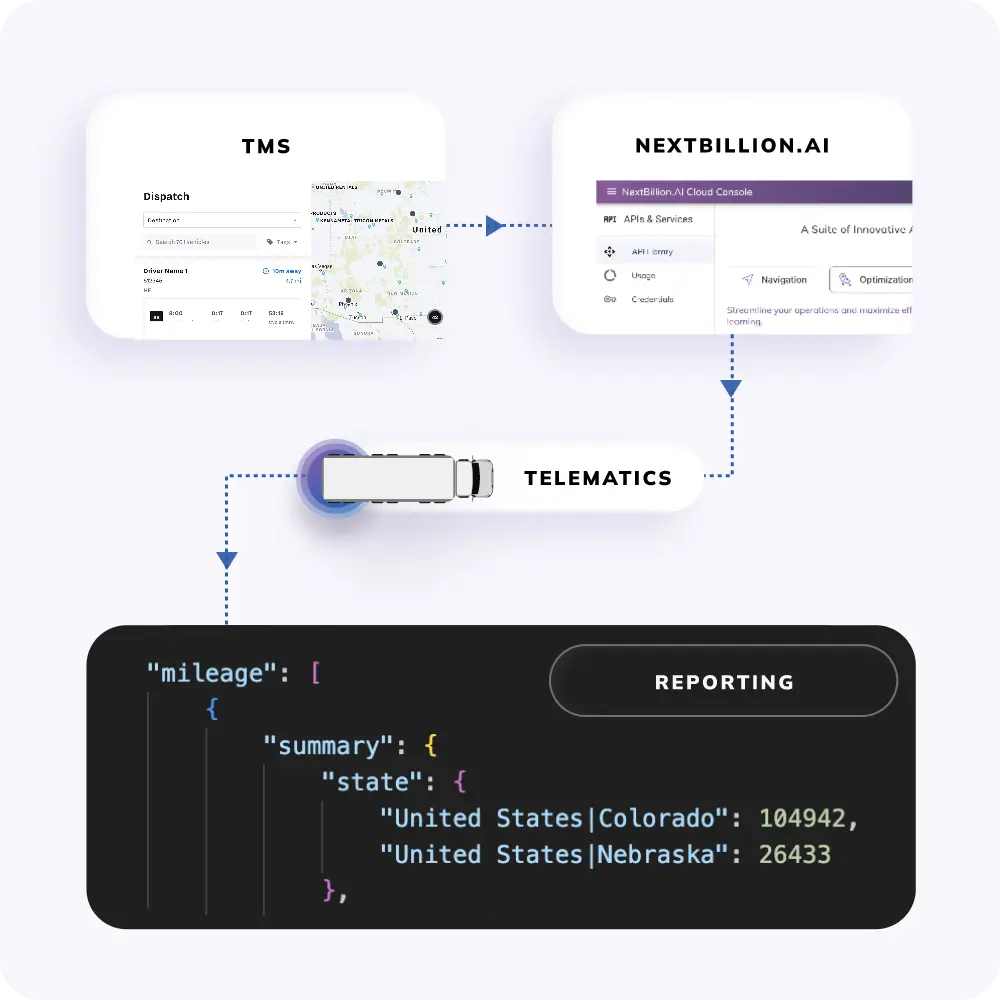

- BLOG
Best Multi-Compartment Truck Models & Route Planning Solutions for Food & Retail Delivery
Published: August 28, 2025
Route Optimization API
Optimize routing, task allocation and dispatch
Distance Matrix API
Calculate accurate ETAs, distances and directions
Directions API
Compute routes between two locations
Driver Assignment API
Assign the best driver for every order
Routing & Dispatch App
Plan optimized routes with 50+ Constraints
Product Demos
See NextBillion.ai APIs & SDKs In action
AI Route Optimization
Learns from Your Fleet’s Past Performance
Platform Overview
Learn about how Nextbillion.ai's platform is designed
Road Editor App
Private Routing Preferences For Custom Routing
On-Premise Deployments
Take Full Control of Your Maps and Routing
Trucking
Get regulation-compliant truck routes
Fleet Management
Solve fleet tracking, routing and navigation
Middle Mile Delivery
Optimized supply chain routes
Construction
Routes for Construction Material Delivery
Oil & Gas
Safe & Compliant Routing
Food & Beverage
Plan deliveries of refrigerated goods with regular shipments
Table of Contents

Multi-compartment truck—often referred to as multi-temperature delivery trucks—are transforming how food and retail businesses transport goods. These vehicles are built with separate, insulated sections, each capable of maintaining its own temperature zone. This allows a single truck to carry frozen foods, chilled produce, and dry goods together without compromising quality or safety.
For food and retail delivery, this capability is more than a convenience, it’s an efficiency multiplier. Instead of sending out multiple vehicles for different product categories, companies can consolidate loads, reduce trips, and cut fuel consumption.
The real advantage comes when these trucks are paired with fleet software for mixed cargo. Advanced route planning solutions ensure that deliveries are scheduled in the most efficient sequence, compartments are loaded for minimal temperature disturbance, and vehicle capacity is fully utilized. For businesses seeking the best multi-compartment trucks and the right routing technology, the combination delivers faster deliveries, lower operating costs, and a clear return on investment.
A multi-compartment delivery truck is a specialized vehicle designed to transport goods that require different storage conditions in a single trip. It’s built with insulated partitions and independent temperature controls, allowing each compartment to maintain its own temperature zone. This setup ensures that frozen items stay frozen, chilled products remain cold, and dry goods are kept at ambient temperature, all within the same load.
Pharmaceutical logistics – Transporting medicines, vaccines, and other healthcare products alongside general supplies.
Multi-compartment trucks play a critical role in modern food and retail delivery operations. By combining multiple temperature zones in one vehicle, they allow businesses to:
Cut fuel and labor costs – Fewer trucks on the road means lower fuel consumption, reduced driver hours, and overall operational savings.
The following models are some of the best multi-compartment truck models available in the market.
Thermo King’s Multi‑Temp Trailer series is a trusted choice for large grocery and retail chains that require reliable two‑zone refrigeration. Known for its durability and precise temperature control, it’s designed to handle high‑volume, mixed‑cargo deliveries without compromising compliance or efficiency.
Features
Suitable For
Pricing
Carrier’s Vector™ Series is an industry leader in electric and hybrid trailer refrigeration, offering both dual and triple‑temperature capabilities. Its all‑electric E‑Drive system reduces emissions and fuel costs, making it a sustainable solution for high‑volume, long‑haul fleets.
Features
Suitable For
Pricing
The Mitsubishi Fuso Canter Eco‑Hybrid blends hybrid efficiency with the flexibility of a multi‑temperature refrigerated body. Designed for urban deliveries, it offers maneuverability, low emissions, and cost savings, making it an excellent choice for city‑based logistics.
Features
Suitable For
Pricing
The Isuzu N‑Series is a dependable workhorse for last‑mile and short‑range delivery. With its compact footprint and customizable multi‑compartment body, it’s a cost‑effective choice for small to medium‑sized businesses delivering mixed cargo in urban areas.
Features
Suitable For
Pricing
The Mercedes‑Benz Actros is a premium heavy‑duty tractor unit designed for long‑distance hauling. When paired with a multi‑compartment refrigerated trailer, it delivers exceptional capacity, customizable temperature zones, and fuel efficiency for regional and cross‑country distribution.
Features
Suitable For
Pricing
The following table summarizes the covered model features:
Model | Temp Zones | Power Type | Best For | Price Range |
Thermo King Multi‑Temp Trailer | 2 | Diesel | Large grocery/retail chains | High |
Carrier Vector™ Series | 2–3 | Electric/Diesel hybrid | Long‑haul, sustainable fleets | Medium–High |
Mitsubishi Fuso Canter Eco‑Hybrid | 2–3 | Hybrid | Urban deliveries | Medium |
Isuzu N‑Series Multi‑Compartment | 2–3 | Diesel | City last‑mile | Low–Medium |
Mercedes‑Benz Actros + Trailer | 2–3 | Diesel | Long‑haul distribution | High |
When evaluating the best multi-compartment trucks for food and retail delivery, consider the following must-have features:
Telematics compatibility – Enables real-time monitoring of temperature, location, and performance, helping prevent spoilage and improve accountability.
Investing in multi-temperature delivery trucks can deliver significant financial and operational advantages:
Example ROI calculation – A fleet replacing three single-temperature trucks with one tri-temperature truck integrated with fleet software for mixed cargo can reduce fuel costs by 25%, labor costs by 20%, and increase asset utilization by up to 30%. Over a year, this can translate to tens of thousands of dollars in savings per vehicle.

Pairing multi-compartment trucks with advanced route planning software unlocks greater efficiency and cost savings in food and retail delivery. Here’s how:
Real-time adjustments for delays or urgent orders – Dynamically updates routes to handle traffic disruptions, last-minute customer requests, or priority shipments without compromising other deliveries.

NextBillion.ai’s Route Optimization API is designed to handle the complexity of running multi-compartment trucks in food and retail delivery, ensuring every cubic meter and temperature zone is used efficiently.
Example: A tri-temperature truck can be configured in NextBillion.ai with three separate capacity dimensions, a max_stops limit to protect product quality, and a defined time_window to ensure compliance with FSMA or HACCP guidelines. Routes are then optimized so that frozen deliveries happen first in the morning, chilled goods midday, and ambient products last—reducing spoilage risk and fuel consumption.
Choosing the right multi-compartment truck model and pairing it with advanced route planning software can transform food and retail delivery operations. From maintaining strict temperature compliance and consolidating multiple loads into fewer trips, to cutting fuel costs and reducing empty miles, the combination delivers measurable ROI. Businesses can stay compliant with FSMA and HACCP regulations, improve on-time performance, and boost customer satisfaction by ensuring every order arrives in perfect condition.
Looking to optimize your multi-compartment fleet for food & retail delivery? Talk to NextBillion.ai today and see the difference.
Shivangi is a seasoned Technical Writer with a passion for simplifying technical concepts. With over 5 years of experience, she specializes in crafting clear and concise documentation for various technical products and platforms.